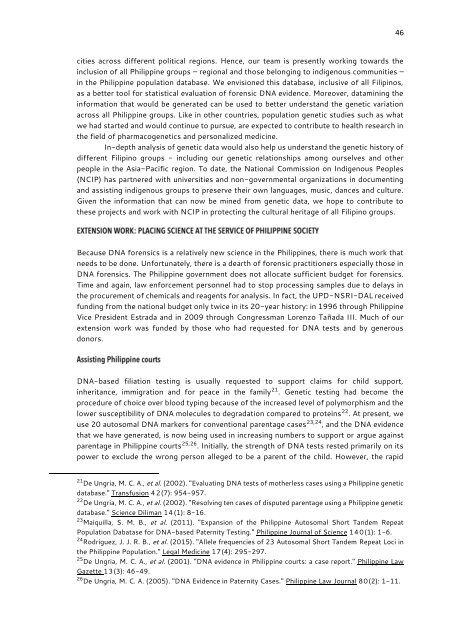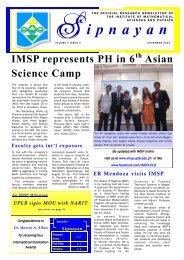A up RESEARCH GUIDEBOOK
33DSJ3
33DSJ3
You also want an ePaper? Increase the reach of your titles
YUMPU automatically turns print PDFs into web optimized ePapers that Google loves.
46<br />
cities across different political regions. Hence, our team is presently working towards the<br />
inclusion of all Philippine gro<strong>up</strong>s – regional and those belonging to indigenous communities –<br />
in the Philippine population database. We envisioned this database, inclusive of all Filipinos,<br />
as a better tool for statistical evaluation of forensic DNA evidence. Moreover, datamining the<br />
information that would be generated can be used to better understand the genetic variation<br />
across all Philippine gro<strong>up</strong>s. Like in other countries, population genetic studies such as what<br />
we had started and would continue to pursue, are expected to contribute to health research in<br />
the field of pharmacogenetics and personalized medicine.<br />
In-depth analysis of genetic data would also help us understand the genetic history of<br />
different Filipino gro<strong>up</strong>s - including our genetic relationships among ourselves and other<br />
people in the Asia-Pacific region. To date, the National Commission on Indigenous Peoples<br />
(NCIP) has partnered with universities and non-governmental organizations in documenting<br />
and assisting indigenous gro<strong>up</strong>s to preserve their own languages, music, dances and culture.<br />
Given the information that can now be mined from genetic data, we hope to contribute to<br />
these projects and work with NCIP in protecting the cultural heritage of all Filipino gro<strong>up</strong>s.<br />
Because DNA forensics is a relatively new science in the Philippines, there is much work that<br />
needs to be done. Unfortunately, there is a dearth of forensic practitioners especially those in<br />
DNA forensics. The Philippine government does not allocate sufficient budget for forensics.<br />
Time and again, law enforcement personnel had to stop processing samples due to delays in<br />
the procurement of chemicals and reagents for analysis. In fact, the UPD-NSRI-DAL received<br />
funding from the national budget only twice in its 20-year history: in 1996 through Philippine<br />
Vice President Estrada and in 2009 through Congressman Lorenzo Tañada III. Much of our<br />
extension work was funded by those who had requested for DNA tests and by generous<br />
donors.<br />
DNA-based filiation testing is usually requested to s<strong>up</strong>port claims for child s<strong>up</strong>port,<br />
inheritance, immigration and for peace in the family 21 . Genetic testing had become the<br />
procedure of choice over blood typing because of the increased level of polymorphism and the<br />
lower susceptibility of DNA molecules to degradation compared to proteins 22 . At present, we<br />
use 20 autosomal DNA markers for conventional parentage cases 23,24 , and the DNA evidence<br />
that we have generated, is now being used in increasing numbers to s<strong>up</strong>port or argue against<br />
parentage in Philippine courts 25,26 . Initially, the strength of DNA tests rested primarily on its<br />
power to exclude the wrong person alleged to be a parent of the child. However, the rapid<br />
21 De Ungria, M. C. A., et al. (2002). "Evaluating DNA tests of motherless cases using a Philippine genetic<br />
database." Transfusion 42(7): 954-957.<br />
22 De Ungria, M. C. A., et al. (2002). "Resolving ten cases of disputed parentage using a Philippine genetic<br />
database." Science Diliman 14(1): 8-16.<br />
23 Maiquilla, S. M. B., et al. (2011). "Expansion of the Philippine Autosomal Short Tandem Repeat<br />
Population Dabatase for DNA-based Paternity Testing." Philippine Journal of Science 140(1): 1-6.<br />
24 Rodriguez, J. J. R. B., et al. (2015). "Allele frequencies of 23 Autosomal Short Tandem Repeat Loci in<br />
the Philippine Population." Legal Medicine 17(4): 295-297.<br />
25 De Ungria, M. C. A., et al. (2001). "DNA evidence in Philippine courts: a case report." Philippine Law<br />
Gazette 13(3): 46-49.<br />
26 De Ungria, M. C. A. (2005). "DNA Evidence in Paternity Cases." Philippine Law Journal 80(2): 1-11.




